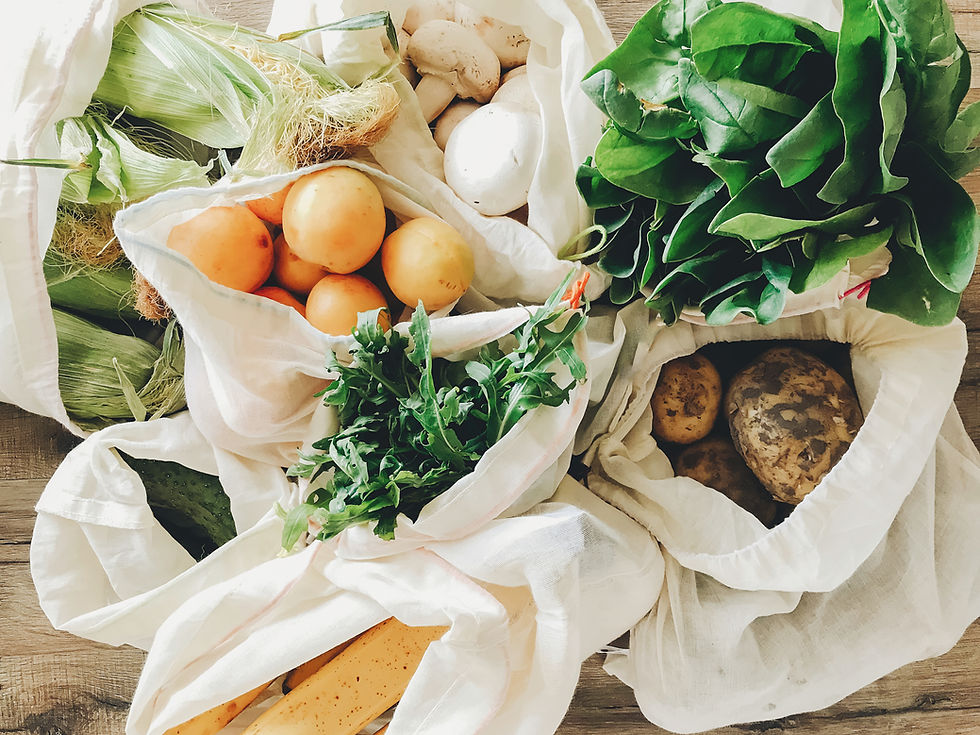PAUSE/PLAY/FORWARD®: COVID-19 ON ORGANIC PRODUCT SALES
- Kiki Tolles
- May 14, 2021
- 3 min read
Updated: Jun 2, 2021
Since the onset of COVID-19, consumers have significantly increased their purchase of organic foods. Let’s use Xpertainment’s Pause/Play/Forward ® framework to evaluate why consumers are demanding more organic options, and how companies are responding.
What do Chipotle, farmers, Walmart, and stay-at-home parents have in common? Well, in 2021, they're all going a bit more organic. While quarantine has undoubtedly upped our appetite for sweets, junk food, and other comfort meals, many people don’t realize that the pandemic has promoted the purchase of healthy, organic goods as well.
In 2020, organic produce sales increased 14.2% from the previous year while sales of conventional goods trailed at 10.7%, according to the 2020 Organic Produce Performance Report. Organic produce now comprises 12% of all fresh produce sales. But what is the reason for this pandemic-induced organic interest, and why does it matter for consumers and restaurants?
“After the onset of COVID-19, the USDA estimates that total organic sales rose 22% from 2019 to 2020.”
PAUSE | Quarantine orders and additional media coverage of food sustainability during the past year have given consumers an opportunity to pause and consider health, nutrition, and sustainability issues that may not have been top-of-mind pre-pandemic. In a study of 3,000 people across eight countries, the Boston Consulting Group (BCG) found that 70% of participants are “more aware now than before COVID-19 that human activity threatens the climate and that degradation of the environment, in turn, threatens humans.” An increase in awareness of agricultural unsustainability might also be due to new media attention. For example, Netflix’s popular documentary Kiss the Ground and the New York Times’ feature article “Can Dirt Save Us?” have made the linkage between agriculture and environment even more apparent.
PLAY | It’s clear that consumers are reconsidering their food choices in light of health and the environment, but the recent growth in organic food purchases is even more dramatic than you might think. During the pandemic, quarantined Americans have been doing more of their own shopping and cooking. When people choose their own ingredients, they’re then more likely to cook and consume organic products than they are at a restaurant. Moreover, the pandemic has heightened our interest in health and nutrition. Since organic foods lack pesticides, some fertilizers, and all antibiotics, they tend to be healthier for the human body than their conventionally-grown counterparts.
After the onset of COVID-19, the USDA estimates that total organic sales rose 22% from 2019 to 2020. Even after the initial pantry-loading panic, sales of organic goods rose steadily such that fresh produce went up $1 billion from the previous year, according to the 2020 Organic Produce Report. Consumers have not only purchased more organic produce, but also more organic meat, eggs, seafood, frozen goods, and snacks.
FORWARD | With consumers prioritizing organic goods in their purchases, many restaurants are re-thinking their menus and suppliers. The recent success of organic-focused food chains points to the growth of interest in organic foods. Restaurants and chains such as Sweet Green, True Food Kitchen, Lyfe Kitchen, Tender Greens, Grown, and Elevation Burger offer menus of all (or almost all) organic goods. While organic goods are often more expensive and harder to come by than conventional products, even major grocery chains like Walmart have announced plans to meet both the demands of consumers and the needs of the ecosystem. “By raising our ambition for climate and nature, we have set ourselves on a path toward becoming a regenerative company...encouraging the adoption of regenerative practices in agriculture, forest management and fisheries,” announced Walmart in their 2020 pledge.
Chipotle, one of the biggest fast-food chains, devoted its entire multi-million dollar 2021 Super Bowl ad to telling their own sustainability story to viewers around the country. In the ad, a young boy asks “Can a burrito change the world?” as he ponders the world-changing effects of burrito ingredients grown ethically and sustainably. In a press release, Chipotle states that “the global pandemic has shifted consumer behavior to lean towards a community-focused society, further igniting a passion...for making purchasing decisions that drive difference in the world around them.”
As the world starts opening up, time will tell if the increase in organic and sustainable goods is, well, sustainable. But in the meantime, consumers around the country seem to be investing in the health of their family and their environment by choosing organic foods. Companies and investors in the food, grocery, and hospitality industries would do well to keep an eye on this trend as they consider investing in products and establishments that are organic--or at least plan to be.




Comments